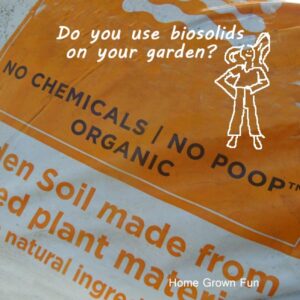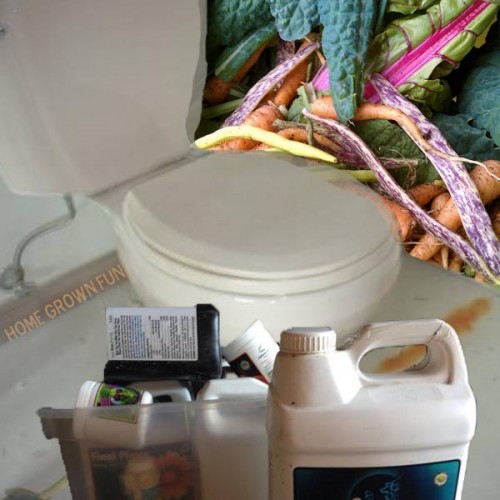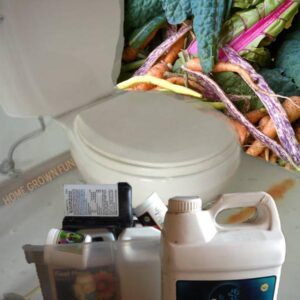WHAT IS SEWAGE SLUDGE?
Sewage sludge is a byproduct of water treatment plants and as you can imagine it’s plentiful. It comes from homes, hospitals and businesses – anything flushed or dumped down the drain.
You’ve got human fecal matter, heavy metals, pathogens, pharmaceuticals, and hundreds of contaminants that are not fully removed even after treatment. It IS regulated but only 13 contaminants are controlled. Hundreds more contaminants with unknown impact on our soil and health go untested.
HOW IS SEWAGE SLUDGE USED?
Farms around the world, including in the U.S., use sewage sludge on agricultural fields. It’s spread on pasture land where cows graze and on soil where edible crops are grown commercially. Many farm stands, markets and even high-end grocery stores (including those popular with organic shoppers) sell fruit and vegetables grown in sludge. But it’s hard to know which ones. There is NO requirement to label or disclose its use as a fertilizer for conventionally grown food.
IS SEWAGE SLUDGE ORGANIC?
Fortunately, sewage sludge is not allowed for use on USDA Certified Organic farms. So you can avoid it by buying “certified organic”.
Del Monte asks its growers to “avoid application of sewage sludge and biosolids (as fertilizers)”.
H.J. Heinz, in its Global Good Agricultural Practices Manual for Vendors states “Applications of municipal sewer sludge and/or human sewage sludge are strictly prohibited.”
FUDGING THE “SLUDGING”
Sewage sludge was renamed as biosolids to make it less yukky. It can show up on a label as “compost”, “organic fertilizer” or one of many brand names such as “Nutri-green”. If you don’t see an explanation for a word, even the word “compost”, look the term up and/or contact the company directly to find out for yourself if the ingredient contains sludge.
SLUDGE IN THE CITIES
If you get compost from a local recycler of municipal waste, you may end up with some form of sewage sludge. When you see the word “organic” don’t assume it is sludge-free. Ask specifically if it contains biosolids (Class A or B ).
Dehydrated sewer sludge is sold by major cities in the United States and branded with catchy names: Los Angeles – Nitrohumus, Milwaukee – Milorganite, New York – Granulite, and Chicago – Nu-Earth. For more brand names, see the link in the comments.
This topic is highly debated and lots of statistics are thrown about on the Internet. I’ve seen discussion threads where representatives of major companies defend their products, while activists chime in with statements that seem valid, and soil scientists and hazardous waste experts attempt to educate us with compelling points for and against the safety of biosolids.
I don’t intentionally use any form of sewage sludge in my garden or on my property. There are too many unknowns.
And I bet I have recently purchased vegetables grown with sludge. I’m looking back and the city compost I got for free years ago probably contained sludge.
I went to Home Depot expecting to find lots of scandalous evidence of sewage sludge in bagged compost and garden soil. I’ve been reading lots about this topic and discovered that manufacturers of commercial compost use all kinds of terminology to mask the fact that the stuff contains sludge.
RESULT? No mention of sewage sludge or biosolids.
8 out of the 10 bags I checked were OMRI listed (comply with USDA organic standards so no sludge allowed) and out of the two bags of compost not OMRI listed, only one had no explanation of what “compost” meant in the ingredients list. That’s good news and surprised me.
What about you? Have you ever knowingly used sewage sludge? Is it a concern to you?



